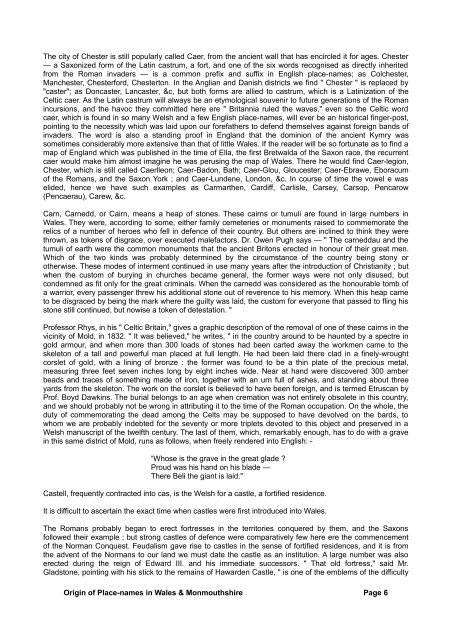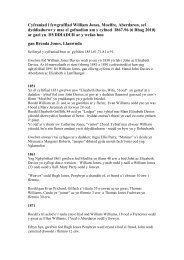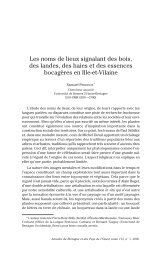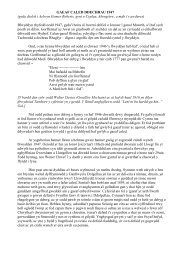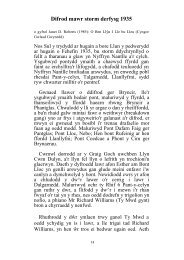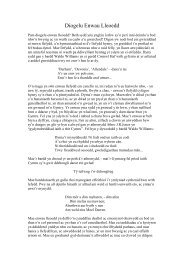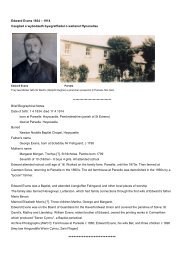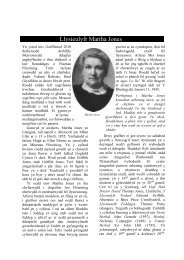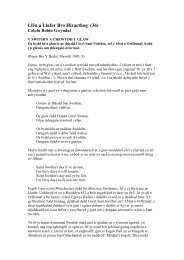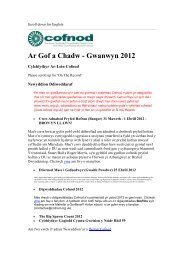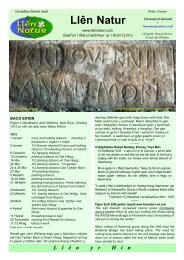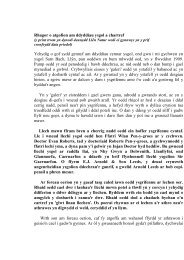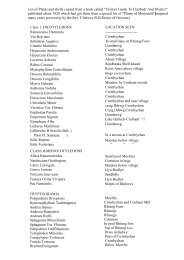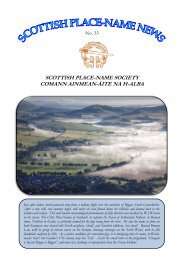Ar signifies " ploughed l<strong>and</strong>." Arddu, to plough. The Greek word for a plough is arotron, <strong>the</strong> Lat<strong>in</strong> is ardtrum,<strong>the</strong> Norse is ardr, <strong>the</strong> Irish is arathar, <strong>and</strong> <strong>the</strong> Welsh is aradr. The English " harrow " was <strong>orig<strong>in</strong></strong>ally a rude<strong>in</strong>strument drawn over ploughed l<strong>and</strong> to level it <strong>and</strong> break <strong>the</strong> clods, <strong>and</strong> to cover seed when sown.Plough<strong>in</strong>g <strong>and</strong> reap<strong>in</strong>g are called " ear<strong>in</strong>g <strong>and</strong> harvest." Compare Gen. xlv., 6. ; Ex. xxxiv.,-21.When at is used as a suffix it generally has an agricultural signification, but when used as a prefix it is apreposition, mean<strong>in</strong>g on, upon: Ardwr, on <strong>the</strong> water; Argoed, on or above a wood.Bettws forms a part <strong>of</strong> a large number <strong>of</strong> our local <strong>names</strong>. Some th<strong>in</strong>k it is a Welshified form <strong>of</strong> <strong>the</strong> Lat<strong>in</strong>beatus, blessed, <strong>and</strong> that it refers to <strong>the</strong> religious <strong>in</strong>stitutions <strong>of</strong> St. Beuno. O<strong>the</strong>rs derive it from abbatis, anappendage to a monastery or an abbey, tak<strong>in</strong>g it as one <strong>of</strong> <strong>the</strong> few Lat<strong>in</strong> words which found a permanent<strong>place</strong> <strong>in</strong> <strong>the</strong> Welsh language.It is derived by some from bod-cwys, a <strong>place</strong> <strong>of</strong> shelter, but <strong>the</strong> most prevalent op<strong>in</strong>ion is that <strong>the</strong> word is aWelshified form <strong>of</strong> bead-house, an ecclesiastical term signify<strong>in</strong>g a hospital or alms-house, where <strong>the</strong> poorprayed for <strong>the</strong>ir founders <strong>and</strong> benefactors." Beads are used by Roman Catholics to keep <strong>the</strong>m right as to <strong>the</strong> number <strong>of</strong> <strong>the</strong>ir prayers, one bead <strong>of</strong> <strong>the</strong>irrosary be<strong>in</strong>g dropped every time a prayer is said; - hence <strong>the</strong> transference <strong>of</strong> <strong>the</strong> name from that which iscounted (<strong>the</strong> prayers) to that which is used to count <strong>the</strong>m. The old phrase to 'bid one's beads' means to sayone's prayers (Imp. Diet)." In a recent communication to us, Pr<strong>of</strong>essor Rhys says " Bettws would bephonologically accounted for exactly by suppos<strong>in</strong>g it to be <strong>the</strong> English bed-Ms or house <strong>of</strong> prayer, but if that<strong>orig<strong>in</strong></strong> be <strong>the</strong> correct one to assume <strong>the</strong>re is <strong>the</strong> historical difficulty: where is <strong>the</strong>re any account <strong>of</strong> this<strong>in</strong>stitution bear<strong>in</strong>g an English name? " There is <strong>the</strong> rub. We cannot f<strong>in</strong>d a s<strong>in</strong>gle <strong>in</strong>stance <strong>of</strong> <strong>the</strong> name be<strong>in</strong>gperpetuated <strong>in</strong> Engl<strong>and</strong>. The Rev. J. Davies, F.S.A., P<strong>and</strong>y, is <strong>of</strong> op<strong>in</strong>ion that "Bettws was never an <strong>in</strong>stitutionproperly speak<strong>in</strong>g, <strong>and</strong> it never existed as a dist<strong>in</strong>ct religious house, but undoubtedly it did exist <strong>in</strong> some<strong>in</strong>stances as a cell <strong>in</strong> connection with large Abbeys. Soon after <strong>the</strong> pr<strong>in</strong>cipal Abbeys had been founded <strong>in</strong> thiscountry, <strong>and</strong> <strong>the</strong>ir fame as seats <strong>of</strong> piety <strong>and</strong> learn<strong>in</strong>g had spread far <strong>and</strong> wide, pilgrims began to flock to<strong>the</strong>m, many <strong>of</strong> whom had long distances to travel, on account <strong>of</strong> which houses <strong>of</strong> prayer, called ead-houses,were erected at long <strong>in</strong>tervals along <strong>the</strong>ir course <strong>in</strong>to which <strong>the</strong> ' wearied pilgrims ' entered to <strong>of</strong>fer prayers on<strong>the</strong>ir way to <strong>and</strong> from <strong>the</strong> Abbey. I believe we never have a Bead-house (Bettws) but on <strong>the</strong> way to an Abbey.When <strong>the</strong> Abbeys were suppressed, most <strong>of</strong> <strong>the</strong>se Bead-houses fell <strong>in</strong>to ru<strong>in</strong>, as a matter <strong>of</strong> course, while afew <strong>of</strong> <strong>the</strong>m may have developed <strong>in</strong>to parish Churches <strong>and</strong> Chapels <strong>of</strong> Ease, after <strong>the</strong> Reformation. I do notth<strong>in</strong>k it has a Welsh <strong>orig<strong>in</strong></strong>, for <strong>the</strong> reason that <strong>the</strong> th<strong>in</strong>g itself was imported from Norm<strong>and</strong>y, <strong>and</strong> I am <strong>of</strong>op<strong>in</strong>ion that Bettws as a <strong>place</strong>-name was not <strong>in</strong> existence prior to <strong>the</strong> Norman Survey."Blaen means extremity, <strong>the</strong> top <strong>of</strong> anyth<strong>in</strong>g. It is frequently used as a prefix <strong>in</strong> <strong>the</strong> <strong>names</strong> <strong>of</strong> <strong>place</strong>s that aresituated at <strong>the</strong> extreme end <strong>of</strong> a valley or near <strong>the</strong> sources <strong>of</strong> brooks <strong>and</strong> rivers. Blaenau afonydd, <strong>the</strong>sources <strong>of</strong> rivers. Dwfry blaenau, water or stream from <strong>the</strong> height.Bod <strong>orig<strong>in</strong></strong>ally meant a lord's residence. Hav<strong>in</strong>g fixed upon a certa<strong>in</strong> spot <strong>of</strong> l<strong>and</strong>, he would build a dwell<strong>in</strong>ghouse<strong>the</strong>reon, which was called bod, <strong>and</strong> <strong>the</strong> name <strong>of</strong> <strong>the</strong> builder or owner was added to dist<strong>in</strong>guish it fromo<strong>the</strong>r dwell<strong>in</strong>g-houses, hence we have Bodowa<strong>in</strong>, Bodedeyrn, &c. He had two residences— _yr Hafod, <strong>the</strong>summer residence, <strong>and</strong> Gauafod, <strong>the</strong> w<strong>in</strong>ter residence. But <strong>in</strong> course <strong>of</strong> time bod was used to designate anyhouse or dwell<strong>in</strong>g-<strong>place</strong>. Compare <strong>the</strong> English " abode."Bron means a round protuberance, <strong>and</strong> is equivalent to <strong>the</strong> English breast. In <strong>place</strong>-<strong>names</strong> it signifies <strong>the</strong>breast <strong>of</strong> a hill. Ar frest y mynydd, is a very common expression, mean<strong>in</strong>g on <strong>the</strong> breast <strong>of</strong> <strong>the</strong> mounta<strong>in</strong>.Bryn seems to be a compound <strong>of</strong> bre, a mounta<strong>in</strong>, <strong>and</strong> <strong>the</strong> dim<strong>in</strong>utive yn; hence breyn, afterwards contracted<strong>in</strong>to bryn, a small mounta<strong>in</strong>, a hill. It enters largely <strong>in</strong>to Welsh <strong>place</strong>-<strong>names</strong>, <strong>and</strong> we f<strong>in</strong>d it also Anglicized <strong>in</strong>Bre<strong>and</strong>own, a high ridge near Weston-super-Mare; Brendon, a part <strong>of</strong> <strong>the</strong> great ridge <strong>of</strong> Exmoor; Br<strong>in</strong>sop,Hereford, &c.Bwlch signifies a break or breach. It is generally found <strong>in</strong> <strong>names</strong> <strong>of</strong> <strong>place</strong>s where <strong>the</strong>re is a narrow pass <strong>in</strong><strong>the</strong> mounta<strong>in</strong>s.Caer is one <strong>of</strong> our enchorial <strong>names</strong> for a wall or mound for defence, <strong>the</strong> wall <strong>of</strong> a city or castle, a fortress.Perhaps <strong>the</strong> root is cau, to shut up, to fence, to enclose with a hedge. Cae means a field enclosed withhedges. Caerau were <strong>the</strong> most ancient military earthworks <strong>in</strong> <strong>the</strong> Pr<strong>in</strong>cipality, <strong>and</strong> when <strong>the</strong> Britons began tobuild cities <strong>the</strong>y surrounded <strong>the</strong>m by a fortified wall called caer.Orig<strong>in</strong> <strong>of</strong> Place-<strong>names</strong> <strong>in</strong> Wales & Monmouthshire Page 5
The city <strong>of</strong> Chester is still popularly called Caer, from <strong>the</strong> ancient wall that has encircled it for ages. Chester— a Saxonized form <strong>of</strong> <strong>the</strong> Lat<strong>in</strong> castrum, a fort, <strong>and</strong> one <strong>of</strong> <strong>the</strong> six words recognised as directly <strong>in</strong>heritedfrom <strong>the</strong> Roman <strong>in</strong>vaders — is a common prefix <strong>and</strong> suffix <strong>in</strong> English <strong>place</strong>-<strong>names</strong>; as Colchester,Manchester, Chesterford, Chesterton. In <strong>the</strong> Anglian <strong>and</strong> Danish districts we f<strong>in</strong>d " Chester " is re<strong>place</strong>d by"caster"; as Doncaster, Lancaster, &c, but both forms are allied to castrum, which is a Lat<strong>in</strong>ization <strong>of</strong> <strong>the</strong>Celtic caer. As <strong>the</strong> Lat<strong>in</strong> castrum will always be an etymological souvenir to future generations <strong>of</strong> <strong>the</strong> Roman<strong>in</strong>cursions, <strong>and</strong> <strong>the</strong> havoc <strong>the</strong>y committed here ere " Britannia ruled <strong>the</strong> waves," even so <strong>the</strong> Celtic wordcaer, which is found <strong>in</strong> so many Welsh <strong>and</strong> a few English <strong>place</strong>-<strong>names</strong>, will ever be an historical f<strong>in</strong>ger-post,po<strong>in</strong>t<strong>in</strong>g to <strong>the</strong> necessity which was laid upon our forefa<strong>the</strong>rs to defend <strong>the</strong>mselves aga<strong>in</strong>st foreign b<strong>and</strong>s <strong>of</strong><strong>in</strong>vaders. The word is also a st<strong>and</strong><strong>in</strong>g pro<strong>of</strong> <strong>in</strong> Engl<strong>and</strong> that <strong>the</strong> dom<strong>in</strong>ion <strong>of</strong> <strong>the</strong> ancient Kymry wassometimes considerably more extensive than that <strong>of</strong> little Wales. If <strong>the</strong> reader will be so fortunate as to f<strong>in</strong>d amap <strong>of</strong> Engl<strong>and</strong> which was published <strong>in</strong> <strong>the</strong> time <strong>of</strong> Ella, <strong>the</strong> first Bretwalda <strong>of</strong> <strong>the</strong> Saxon race, <strong>the</strong> recurrentcaer would make him almost imag<strong>in</strong>e he was perus<strong>in</strong>g <strong>the</strong> map <strong>of</strong> Wales. There he would f<strong>in</strong>d Caer-legion,Chester, which is still called Caerlleon; Caer-Badon, Bath; Caer-Glou, Gloucester; Caer-Ebrawe, Eboracum<strong>of</strong> <strong>the</strong> Romans, <strong>and</strong> <strong>the</strong> Saxon York ; <strong>and</strong> Caer-Lundene, London, &c. In course <strong>of</strong> time <strong>the</strong> vowel e waselided, hence we have such examples as Carmar<strong>the</strong>n, Cardiff, Carlisle, Carsey, Carsop, Pencarow(Pencaerau), Carew, &c.Carn, Carnedd, or Cairn, means a heap <strong>of</strong> stones. These cairns or tumuli are found <strong>in</strong> large numbers <strong>in</strong>Wales. They were, accord<strong>in</strong>g to some, ei<strong>the</strong>r family cemeteries or monuments raised to commemorate <strong>the</strong>relics <strong>of</strong> a number <strong>of</strong> heroes who fell <strong>in</strong> defence <strong>of</strong> <strong>the</strong>ir country. But o<strong>the</strong>rs are <strong>in</strong>cl<strong>in</strong>ed to th<strong>in</strong>k <strong>the</strong>y werethrown, as tokens <strong>of</strong> disgrace, over executed malefactors. Dr. Owen Pugh says — " The carneddau <strong>and</strong> <strong>the</strong>tumuli <strong>of</strong> earth were <strong>the</strong> common monuments that <strong>the</strong> ancient Britons erected <strong>in</strong> honour <strong>of</strong> <strong>the</strong>ir great men.Which <strong>of</strong> <strong>the</strong> two k<strong>in</strong>ds was probably determ<strong>in</strong>ed by <strong>the</strong> circumstance <strong>of</strong> <strong>the</strong> country be<strong>in</strong>g stony oro<strong>the</strong>rwise. These modes <strong>of</strong> <strong>in</strong>terment cont<strong>in</strong>ued <strong>in</strong> use many years after <strong>the</strong> <strong>in</strong>troduction <strong>of</strong> Christianity ; butwhen <strong>the</strong> custom <strong>of</strong> bury<strong>in</strong>g <strong>in</strong> churches became general, <strong>the</strong> former ways were not only disused, butcondemned as fit only for <strong>the</strong> great crim<strong>in</strong>als. When <strong>the</strong> carnedd was considered as <strong>the</strong> honourable tomb <strong>of</strong>a warrior, every passenger threw his additional stone out <strong>of</strong> reverence to his memory. When this heap cameto be disgraced by be<strong>in</strong>g <strong>the</strong> mark where <strong>the</strong> guilty was laid, <strong>the</strong> custom for everyone that passed to fl<strong>in</strong>g hisstone still cont<strong>in</strong>ued, but nowise a token <strong>of</strong> detestation. "Pr<strong>of</strong>essor Rhys, <strong>in</strong> his " Celtic Brita<strong>in</strong>," gives a graphic description <strong>of</strong> <strong>the</strong> removal <strong>of</strong> one <strong>of</strong> <strong>the</strong>se cairns <strong>in</strong> <strong>the</strong>vic<strong>in</strong>ity <strong>of</strong> Mold, <strong>in</strong> 1832. " It was believed," he writes, " <strong>in</strong> <strong>the</strong> country around to be haunted by a spectre <strong>in</strong>gold armour, <strong>and</strong> when more than 300 loads <strong>of</strong> stones had been carted away <strong>the</strong> workmen came to <strong>the</strong>skeleton <strong>of</strong> a tall <strong>and</strong> powerful man <strong>place</strong>d at full length. He had been laid <strong>the</strong>re clad <strong>in</strong> a f<strong>in</strong>ely-wroughtcorslet <strong>of</strong> gold, with a l<strong>in</strong><strong>in</strong>g <strong>of</strong> bronze : <strong>the</strong> former was found to be a th<strong>in</strong> plate <strong>of</strong> <strong>the</strong> precious metal,measur<strong>in</strong>g three feet seven <strong>in</strong>ches long by eight <strong>in</strong>ches wide. Near at h<strong>and</strong> were discovered 300 amberbeads <strong>and</strong> traces <strong>of</strong> someth<strong>in</strong>g made <strong>of</strong> iron, toge<strong>the</strong>r with an urn full <strong>of</strong> ashes, <strong>and</strong> st<strong>and</strong><strong>in</strong>g about threeyards from <strong>the</strong> skeleton. The work on <strong>the</strong> corslet is believed to have been foreign, <strong>and</strong> is termed Etruscan byPr<strong>of</strong>. Boyd Dawk<strong>in</strong>s. The burial belongs to an age when cremation was not entirely obsolete <strong>in</strong> this country,<strong>and</strong> we should probably not be wrong <strong>in</strong> attribut<strong>in</strong>g it to <strong>the</strong> time <strong>of</strong> <strong>the</strong> Roman occupation. On <strong>the</strong> whole, <strong>the</strong>duty <strong>of</strong> commemorat<strong>in</strong>g <strong>the</strong> dead among <strong>the</strong> Celts may be supposed to have devolved on <strong>the</strong> bards, towhom we are probably <strong>in</strong>debted for <strong>the</strong> seventy or more triplets devoted to this object <strong>and</strong> preserved <strong>in</strong> aWelsh manuscript <strong>of</strong> <strong>the</strong> twelfth century. The last <strong>of</strong> <strong>the</strong>m, which, remarkably enough, has to do with a grave<strong>in</strong> this same district <strong>of</strong> Mold, runs as follows, when freely rendered <strong>in</strong>to English: -“Whose is <strong>the</strong> grave <strong>in</strong> <strong>the</strong> great glade ?Proud was his h<strong>and</strong> on his blade —There Beli <strong>the</strong> giant is laid."Castell, frequently contracted <strong>in</strong>to cas, is <strong>the</strong> Welsh for a castle, a fortified residence.It is difficult to ascerta<strong>in</strong> <strong>the</strong> exact time when castles were first <strong>in</strong>troduced <strong>in</strong>to Wales.The Romans probably began to erect fortresses <strong>in</strong> <strong>the</strong> territories conquered by <strong>the</strong>m, <strong>and</strong> <strong>the</strong> Saxonsfollowed <strong>the</strong>ir example ; but strong castles <strong>of</strong> defence were comparatively few here ere <strong>the</strong> commencement<strong>of</strong> <strong>the</strong> Norman Conquest. Feudalism gave rise to castles <strong>in</strong> <strong>the</strong> sense <strong>of</strong> fortified residences, <strong>and</strong> it is from<strong>the</strong> advent <strong>of</strong> <strong>the</strong> Normans to our l<strong>and</strong> we must date <strong>the</strong> castle as an <strong>in</strong>stitution. A large number was alsoerected dur<strong>in</strong>g <strong>the</strong> reign <strong>of</strong> Edward III. <strong>and</strong> his immediate successors. " That old fortress," said Mr.Gladstone, po<strong>in</strong>t<strong>in</strong>g with his stick to <strong>the</strong> rema<strong>in</strong>s <strong>of</strong> Hawarden Castle, " is one <strong>of</strong> <strong>the</strong> emblems <strong>of</strong> <strong>the</strong> difficultyOrig<strong>in</strong> <strong>of</strong> Place-<strong>names</strong> <strong>in</strong> Wales & Monmouthshire Page 6
- Page 1 and 2: HANDBOOK OF THE ORIGIN OF PLACE-NAM
- Page 3 and 4: § § § § §The Author begs to st
- Page 5 and 6: pitiful cries of the railway offici
- Page 7: Bishop Percy says that "in England,
- Page 11 and 12: There's Cumwhitton, Cumwhinton, Cum
- Page 13 and 14: Llwyn in its primary' sense means a
- Page 15 and 16: PLACE-NAMES IN WALES.Wales. — The
- Page 17 and 18: Church are generally dedicated to e
- Page 19 and 20: think he was a contemporary of St.
- Page 21 and 22: Rhosbeirio. — Rhos, a moor, a dry
- Page 23 and 24: of Brecknock," states that this vic
- Page 25 and 26: Cam cnwir ef Cwmdu,Cwm gwyn yw & n
- Page 27 and 28: Penderyn. — A corruption probably
- Page 29 and 30: Ardudwy. — Ar, upon or above; tud
- Page 31 and 32: to mark its pre-eminence over the o
- Page 33 and 34: Some think that eirw is a corruptio
- Page 35 and 36: present form — Caerfyrddin.Abergw
- Page 37 and 38: place of refuge; hence the name. En
- Page 39 and 40: Llansawyl. — The church was dedic
- Page 41 and 42: eject. The village took its name fr
- Page 43 and 44: house, and attempted to kill an inf
- Page 45 and 46: Gwydir. — Prima facie one may tak
- Page 47 and 48: Nefyn. — The church was probably
- Page 49 and 50: DENBIGHSHIRE.Anglicized form of Din
- Page 51 and 52: Llangollen. — From Collen, a sain
- Page 53 and 54: hands into their pockets to pay a c
- Page 55 and 56: Cefn. — The name signifies a ridg
- Page 57 and 58: Maesgarmon. — Named in honour of
- Page 59 and 60:
Abertridwr. — Tridwr, three water
- Page 61 and 62:
it is said, was originally built by
- Page 63 and 64:
Cwmllynfell. — Cwm, a narrow vale
- Page 65 and 66:
Gwarycaeau. — Gwdr, the nape of t
- Page 67 and 68:
means a cultivated region, a vale,
- Page 69 and 70:
Penrhiwfer.- Pen, head, top; rhiw,
- Page 71 and 72:
Port Talbot. — So called in 1835
- Page 73 and 74:
Trealaw. — This appellation was g
- Page 75 and 76:
Aberdyfi. — So called from its si
- Page 77 and 78:
Llanddwywe. — From Dwywau, a desc
- Page 79 and 80:
Crickhowell and some in the directi
- Page 81 and 82:
Griffithstown. — This village was
- Page 83 and 84:
and gwy, water. Treiddiod troth tna
- Page 85 and 86:
derive Tintern from din, fortified
- Page 87 and 88:
Caersws. — It appears that the Ro
- Page 89 and 90:
English name — Ervylton.Llanymech
- Page 91 and 92:
Angle. — Probably from the angle-
- Page 93 and 94:
Gellyswick. — Another hybrid. Gel
- Page 95 and 96:
that the two rivers in their flowin
- Page 97 and 98:
ecame the bishop of the see, and wa
- Page 99 and 100:
earth formerly stood on a summit on
- Page 101 and 102:
Pilleth. — A corruption of pwll,
- Page 103 and 104:
Howells, Rev. J., Mountain AshHowel
- Page 105 and 106:
Williams, D., PenywernWilliams, Rev


